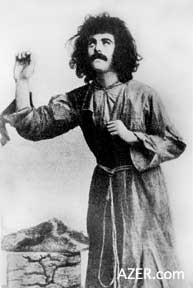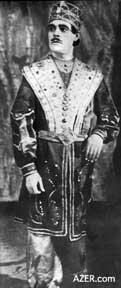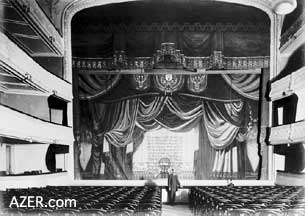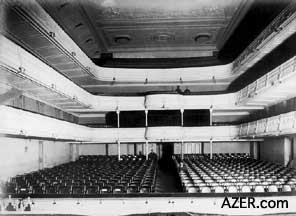|
Above Left: Interior of Baku's first Drama Theater, where Sarabski performed in operas such as "Leyli and Majnun" (1908) and "Shah Ismayil" (1917). View facing the stage. Right: View from the stage. Note the upper balcony, which was reserved for women and screened off from men's view with black netting. Women were not permitted to sit with their husbands. "Since I was playing the lead role, Majnun, opposite Leyli, sometimes in desperation, I would just walk out of the rehearsals. But then my enthusiasm for the opera made me come back. "On opening night [January 12, 1908] we had a lot of trouble with Abdulrahim. Suddenly, I heard screams coming from his makeup room. I went there, and what did I see? The person who was to play Leyli was ranting: 'What sort of paint is this? I'm not going to put this on my face!' Somehow we eventually persuaded him to put makeup on so he could perform the role of Leyli. "As for my role as Majnun, I made myself up as a black slave. Once I had seen a black slave in the Inner City. He had been brought from Mecca by a Haji [a Muslim pilgrim]. Naturally, I thought that all Arabs were black, so I fashioned myself into a black man. "When we appeared on stage, we eventually succeeded in quieting the people, but not without great difficulty. For many of them, it was the first time that they had ever been in a theater. They didn't know how to behave themselves. "When the play began, such a deep silence fell over the crowd that it seemed as if the theater were empty. But at the end, when the curtain closed, the people applauded me enthusiastically and repeatedly called me back to the stage. Backstage, my friends embraced and kissed me. I was so happy that I couldn't hold back my tears. "Then I heard someone yelling: 'How do I get this paint off my face?' I knew right away that it was Farajov. I went and found him standing in front of the water basin, trying to wash his face with water. He didn't realize that the varnish [lacquer] we had used to cover his moustache becomes even harder when it is mixed with water. The more he wet his face, the harder the varnish became. "The greasepaint had not been cleaned off of his face, and was bothering him. When I saw the situation, I grabbed him and pulled him away from the faucet. I tried to clean his face with petroleum jelly. He looked at me in disgust and said: 'I won't let you grease my face with that pork fat!' And so it was with great difficulty that we succeeded in cleaning off his face." In this way, Sarabski saved Farajov's mustache from being cut off. Back in the early 1900s, it would have been disgraceful for a Muslim man in Baku not to sport a moustache. Performing in Shusha Sarabski also recounts the first performance of "Leyli and Majnun" in the city of Shusha, the cultural center of the Karabakh province of Azerbaijan. [These days Shusha is under military occupation by Armenians. In 1992, during the war in Karabakh, all Azerbaijanis were forced to leave, fleeing for their lives.] Sarabski writes: "The tickets for the two performances were sold out. Half an hour before the play, the entire hall and all of the corridors were filled with theatergoers. There was such a crowd of people. Those who wanted to see the play tried to bribe the doormen 5 to 10 rubles [the equivalent of a Baku oil worker's monthly salary at the time]. "They were told: 'All of the tickets have been sold out.' "The people replied: 'We don't want to hear that! We just want to see the opera. Here's the money.' "The director of the theater was so frustrated that he didn't know what to do. When he asked my opinion, I said: 'Open the windows, let all of the people listen!' "The curtain was lifted. The chorus opened with 'Shabu-Hijran' [Night of Separation], and the hall was hushed in silence and anticipation." Sparks of Controversy Baku's religious fanatics threatened Sarabski on several occasions because he was involved in the theater. "We were performing the comedy 'Yagishdan Chikhdig Yaghmura Dushduk' (Out of the Rain Shower, Into the Rain Downpour) by Najafbey Vazirov," he recalls. "In this play, Haji Gambar says to his servant: 'Jabi, be quick! Go and call Molla Safi!' I happened to be playing the role of Haji Gambar at the time. Somehow these words implicated me in a great sin. "The next morning I was walking along Gala Street [now Boyuk Gala, or Big Fortress Street, referring to Maiden's Tower] in the Inner City. Suddenly, somebody with a tall papag [national Azerbaijani hat] appeared in my path and asked me: 'Were you the one playing Haji Gambar in the theater last night?' "'Yes,' I replied. "'Isn't it enough that you perform on stage? Why do you have to mention the names of our mollas?' Saying this, he punched me in the face and ran away. I tried to catch him but failed." Traditional Muslims were especially enraged when Sarabski and other artists tried to encourage women to attend their plays. Sarabski writes: "After a long discussion, we dared to write on our playbills that there were special enclosed boxes [on the second balcony] so that women could attend the theater, too. As a result, a great scandal broke out in Baku. We were not able to show our faces in the streets or markets. Everybody who met us said: 'We kept silent when you separated our boys from religion, but now you want to corrupt our women, too?' They attacked us with such rage and started swearing at us with such coarse language that I'm too embarrassed to write their words here." Tour Through Iran Despite this opposition, Uzeyir Hajibeyov and his friends resolved to continue their efforts. They were eager to cultivate a European-type theater culture in the Muslim East. In 1918, they performed "Arshin Mal Alan" (The Cloth Peddler) in Tiflis (now Tbilisi, Georgia). The musical comedy was a great success. Next, the theater group went on tour in Iran, where they performed "O Olmasin, Bu Olsun" (If Not This One, That One) and "Blacksmith Gaveh" in Tabriz, Rasht, Tehran and other cities. Sarabski writes that both the Iranian government and the Russian representative in Iran prohibited the performance of "Blacksmith Gaveh" in Tehran because the plot contained revolutionary ideas. Nevertheless, people filed into the theater with tickets in their hands and demanded to see the play. Even though there had been threats by the Shah's officials and the Czar's military officers assigned to Iran, the play was performed. The memoirs of Sarabski contain many other interesting facts about the early history of theater in Azerbaijan. These memories were published for the first time under the title "Recollections of an Artist" in 1926 in the magazine "Maarif and Madaniyyat" (Education and Culture). In 1930, they were printed in the form of a booklet. Sarabski well understood the significance of his memories. Yazichi Publishing House republished them in 1982. In his other book of memoirs, "Kohna Baki" (Old Baku), Sarabski writes: "I was witness to many events during my lifetime of half a century. The tradition of our fathers and grandfathers and my own observations contain some typical details which might be of interest to our youth." Sarabski was absolutely right. With time, his recollections about old Baku have become even more relevant, and are read with growing interest. ____ Back to Index
AI 10.3 (Autumn 2002) |



 Sarabski
developed a close relationship with composer Uzeyir Hajibeyov
(1885-1948), the
Sarabski
developed a close relationship with composer Uzeyir Hajibeyov
(1885-1948), the 
